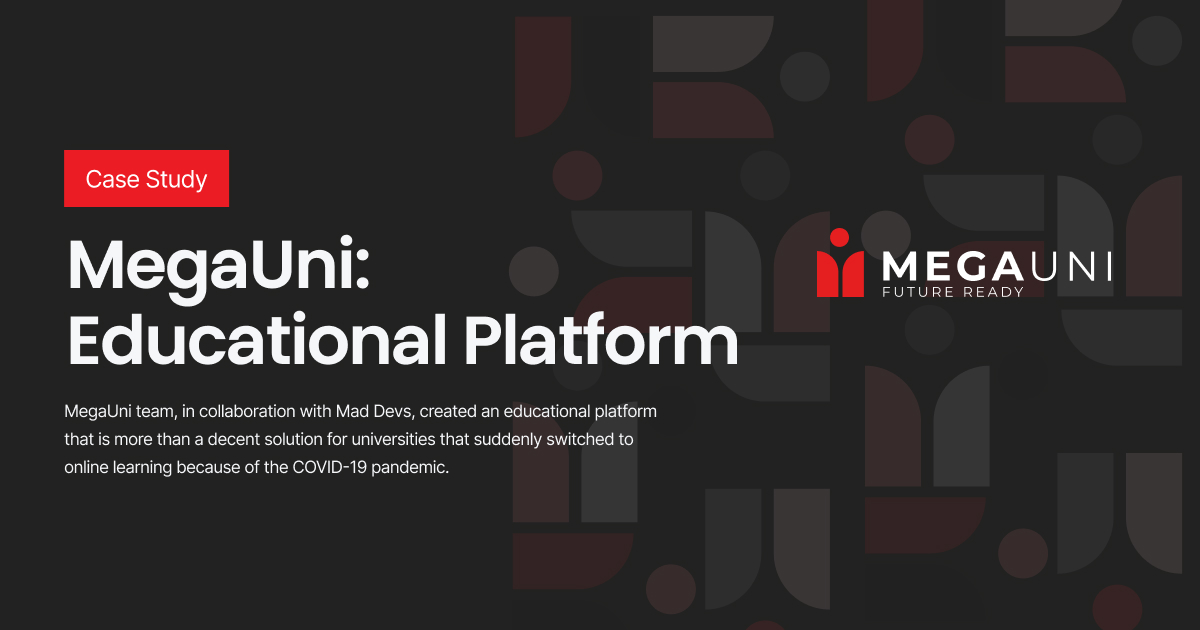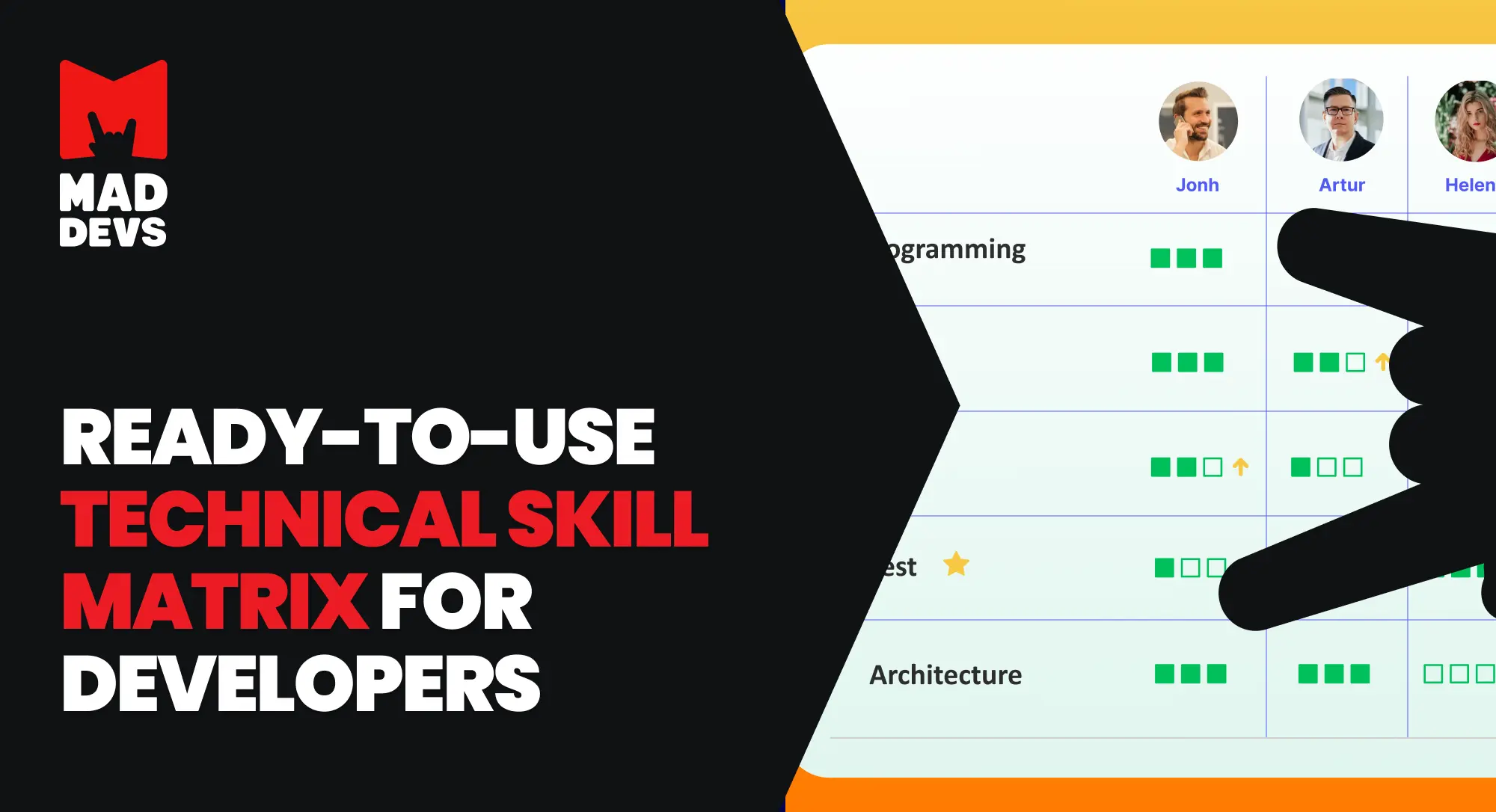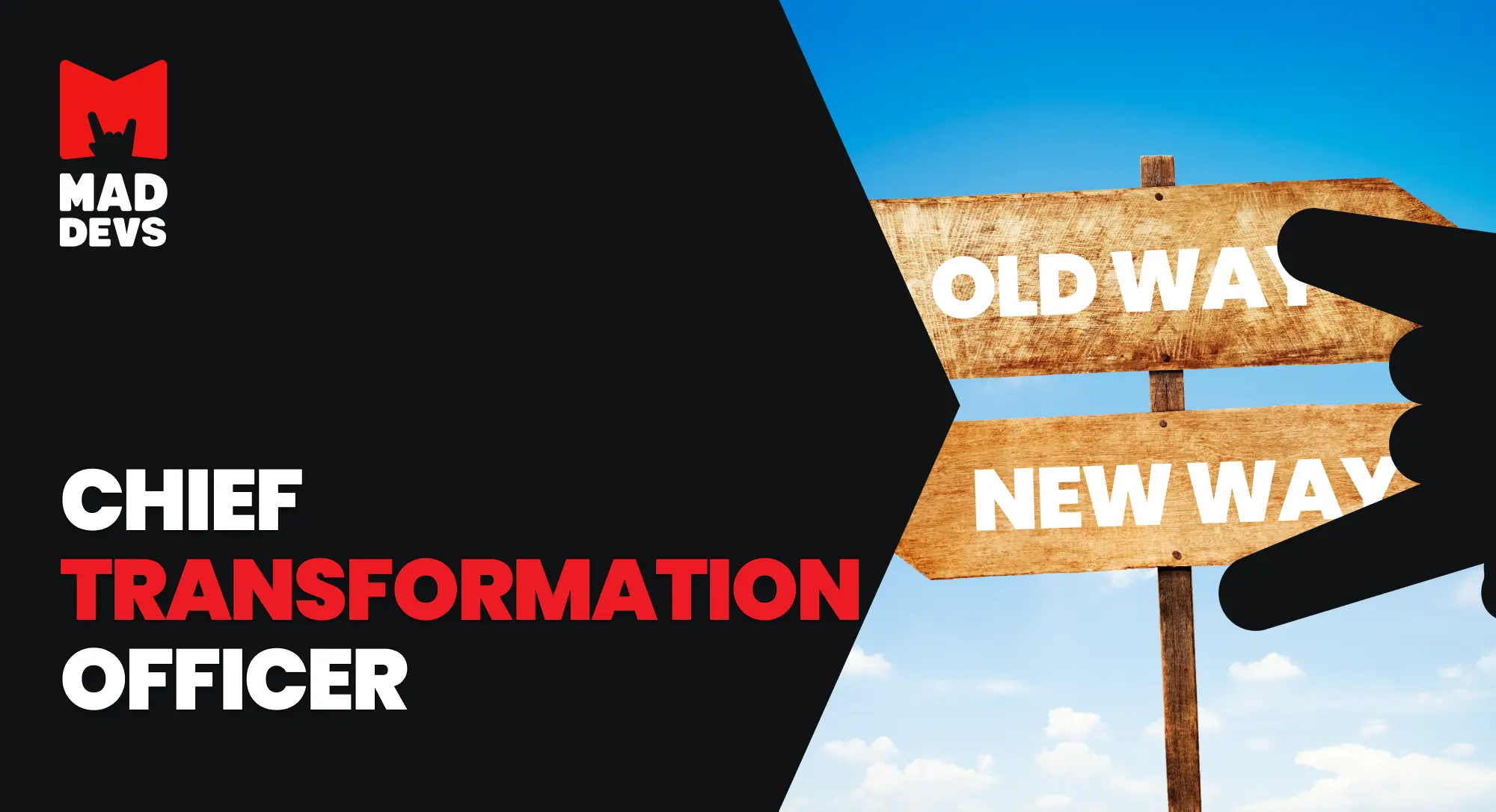Analyze with AI
Get AI-powered insights from this Mad Devs article:
In today's data-driven world, organizations rely heavily on accurate and reliable data to make informed decisions, gain valuable insights, and drive business growth. However, harnessing the power of data is no easy task. Data is often scattered across multiple sources, comes in different formats, and requires careful manipulation to extract meaningful information from it. This is where ETL and the role of an ETL developer come into play.
ETL developers are the unsung heroes behind the scenes of successful data management. They possess a unique set of skills that allow them to extract data from various sources, transform it into a consistent and usable format, and load it into a central repository for analysis and reporting.
In this article, we will delve into the world of ETL developers and explore their crucial roles and responsibilities in detail. Furthermore, we will discuss the importance of ETL in data management, the optimal scenarios for hiring an ETL developer, and identify the signs that indicate when an organization could benefit from its expertise.
A brief overview of ETL
ETL stands for Extract, Transform, Load. It refers to the process of extracting data from various sources, transforming it into a consistent and meaningful format, and loading it into a target destination, typically a data warehouse or a data mart. ETL is very important in enabling organizations to collect, integrate, and utilize data effectively for decision-making and analysis.
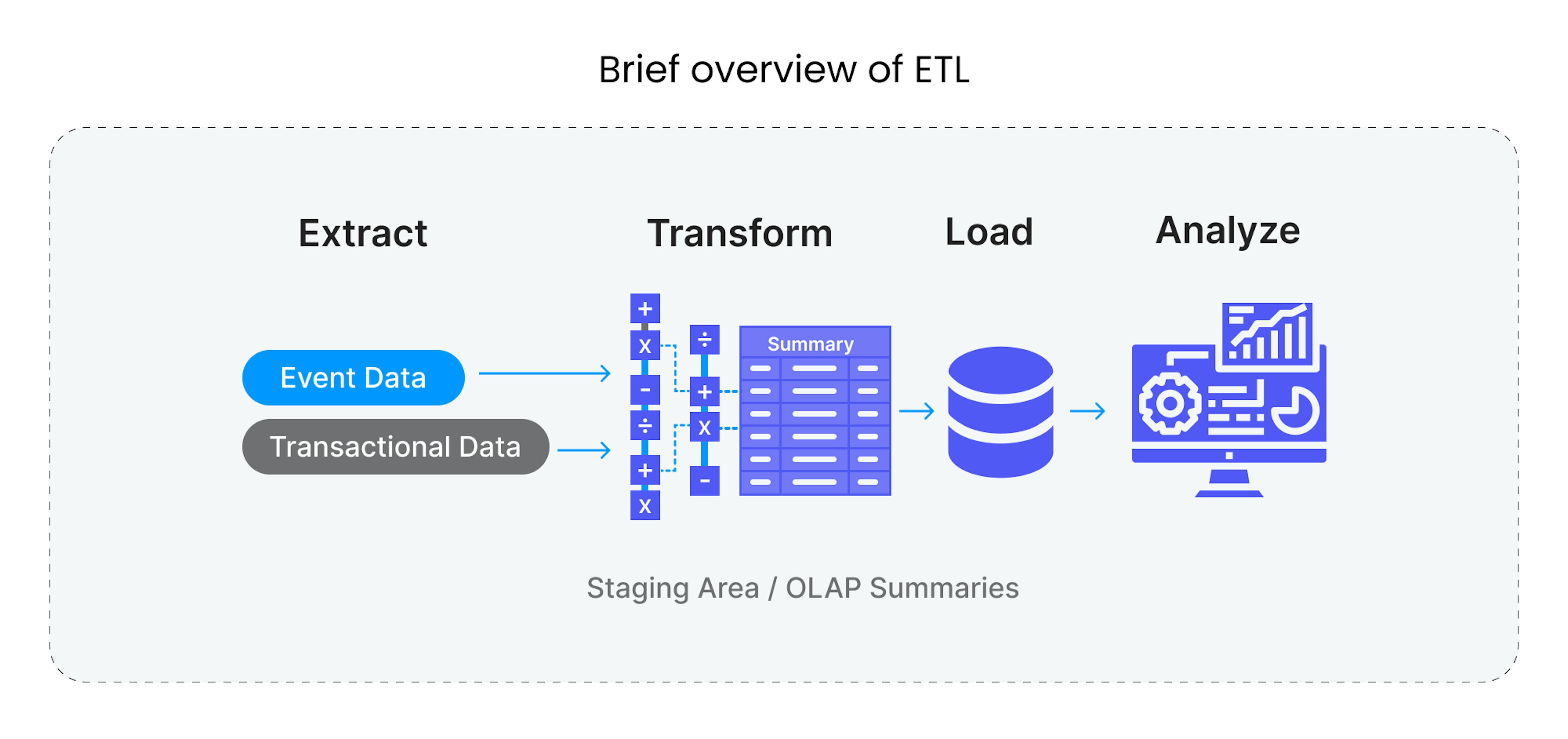
ETL is utilized by a wide range of organizations and industries that deal with large volumes of data:
Enterprises and corporations
Retail chains with multiple branches and extensive inventory systems that need to integrate sales data, customer data, and inventory data for analysis and reporting.
Telecom companies consolidate data from different sources like billing systems, call detail records, and customer support systems to gain insights into customer behavior, network performance, and revenue analysis.
Manufacturing companies integrate data from various departments, such as production, supply chain, and quality control to optimize operations and identify areas for improvement.
Business intelligence and analytics companies
Market research companies aggregate data from surveys, social media platforms, and other sources to analyze consumer trends, preferences, and market dynamics.
Data analytics firms extract, transform, and load data from diverse sources to provide clients with comprehensive insights, predictive modeling, and data-driven recommendations.
E-commerce and online retailers
E-commerce companies consolidate data from online advertising platforms, customer reviews, and website analytics to optimize marketing campaigns, conversion rates, and user experience.
Online retail platforms integrate data from different vendors, inventory systems, and customer interactions to manage product catalogs, track sales, and personalize customer experiences.
Healthcare organizations
Hospitals and healthcare providers integrate patient data from electronic health records (EHRs), laboratory systems, and billing systems to ensure accurate medical records, streamline workflows, and facilitate data-driven decision-making.
Pharmaceutical companies merge data from clinical trials, drug safety databases, and research studies to evaluate drug efficacy, monitor adverse events, and support regulatory compliance.
Financial institutions
Banks integrate data from various sources, such as transactional systems, customer relationship management (CRM) platforms, and external data providers, to assess credit risk, detect fraudulent activities, and analyze customer behavior.
Insurance companies aggregate data from policy administration systems, claims databases, and actuarial models to underwrite policies, assess risks, and determine insurance premiums.
Government agencies
Tax authorities consolidate taxpayer data from multiple systems, including income records, tax returns, and financial statements, to streamline tax compliance, identify discrepancies, and conduct audits.
Educational institutions
Universities and colleges integrate data from student information systems, learning management systems, and research databases to support academic planning, student performance analysis, and institutional reporting.
Educational technology companies combine data from various online learning platforms, student engagement tools, and assessment systems to offer personalized learning experiences and measure educational outcomes.
ETL developers play a vital role in designing, implementing, and maintaining robust ETL processes, ensuring that organizations have accurate, consistent, and actionable data to drive their success in the data-driven era. Let's look at their work in detail.
What does an ETL developer do
An ETL developer typically works as part of a data engineering team, which is responsible for tasks such as data extraction, processing, storage, and infrastructure maintenance. The primary objective of the data engineering team is to acquire raw data, determine the necessary modifications for usability, make the data usable, and store it appropriately.
The composition of the team varies depending on the project scope, goals, data processing steps, and required technologies. Therefore, the data engineering team may consist of the following roles: Data Architect, Data Engineer, Data Analyst, Data Scientist, Database Administrator, Business Intelligence Developer, and ETL Developer.
And ETL developer encompasses the Extract, Transform, and Load stages of data processing by creating and managing the necessary infrastructure:
- Extracts data
They retrieve data from various sources such as databases, APIs, or files, ensuring data consistency, accuracy, and completeness during the extraction process. - Transforms data
They clean, validate, and transform the extracted data into a standardized and usable format. This involves applying business rules, data mapping, and data enrichment to ensure data quality and compatibility. - Loads data
They load the transformed data into a target destination, typically a data warehouse or data mart, making it accessible for analysis and reporting purposes. This involves designing and creating data models, developing ETL workflows, and implementing strategies to ensure data integrity and quality.
Moreover, ETL developers do the following:
- Utilizes ETL tools and technologies
They work with ETL tools such as Informatica, Talend, or SSIS, and have proficiency in SQL scripting. They leverage these tools and technologies to perform data extraction, transformation, and loading tasks efficiently. - Performs data analysis and troubleshooting
They identify and resolve data inconsistencies, anomalies, and errors that may occur during the ETL process.
The interesting fact is there are several popular job titles associated with ETL developers, depending on the specific responsibilities and expertise required by the organization. Here are some common job titles before the term "ETL developer" becomes popular:
| JOB TITLE | RESPONSIBILITIES |
|---|---|
| Database Developers | Database developers are responsible for writing database queries, creating database objects (tables, views, stored procedures), and optimizing database performance. They work closely with application developers to ensure efficient data access and manipulation. |
| Oracle Database Administrators | Oracle database administrators focus on managing and maintaining Oracle database systems. They handle tasks such as database installation, configuration, performance tuning, backup and recovery, and ensuring data security. |
| Data Integration Developer | This job title emphasizes the focus on data integration. Data integration developers specialize in integrating data from various sources and transforming it into a unified format for storage, analysis, and reporting purposes. |
| Data Engineer | Data engineers are responsible for designing and building data infrastructure, including ETL processes. They work on data integration, data modeling, and ensuring the scalability, reliability, and performance of data systems. |
| Data Modelers | Data modelers are responsible for designing data models that represent the structure, relationships, and attributes of data. They collaborate with stakeholders to create conceptual, logical, and physical data models that guide database design and development. |
| SQL Database Administrators | SQL database administrators specialize in managing and maintaining SQL-based database systems. They handle tasks such as database design, SQL query optimization, data security, and database performance tuning. |
| Data Center Technicians | Data center technicians support the operations of data centers, including managing hardware, network infrastructure, and server maintenance. They handle tasks such as server installation, equipment troubleshooting, and data center security. |
| Big Data Engineers | Big Data Engineers specialize in handling large volumes of data, often in distributed or clustered environments. They design, develop, and maintain Big Data systems, including data ingestion, data processing, and data storage solutions. |
| Salesforce Administrators | Salesforce administrators specialize in managing and configuring Salesforce CRM systems. They handle tasks such as user management, data import/export, customization, workflow automation, and system maintenance. |
It's important to note that job titles can vary between organizations, and the specific responsibilities and skill requirements may differ. However, this table provides a general idea of the roles and responsibilities associated with ETL development and data integration.
What skills and qualifications does an ETL developer need
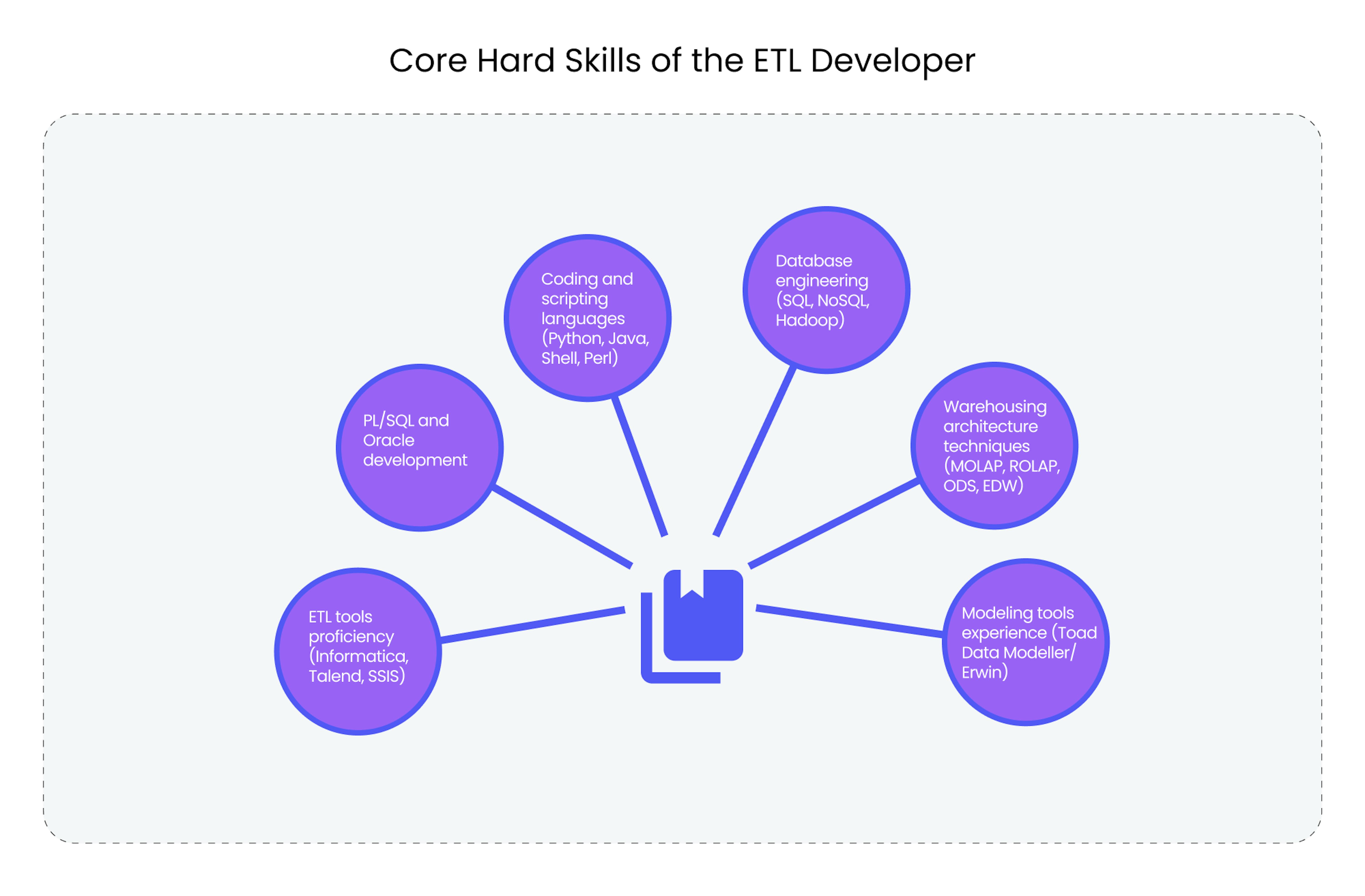
An ETL developer possesses specialized skills that span multiple domains. With a background in software engineering and database development, an ETL developer brings a unique combination of expertise. While the general profile of an ETL developer is clear, let's delve into the specific skills that define this role.
| TECHNICAL SKILLS | |
|---|---|
| SQL and database knowledge | Strong SQL (Structured Query Language) skills are crucial for querying and manipulating data from databases. ETL developers should be proficient in writing complex SQL queries, understanding database schemas, and optimizing database performance. Knowledge of relational database management systems (DBMS) like Oracle, Microsoft SQL Server, or MySQL is also beneficial. |
| ETL tools | Proficiency in popular ETL tools such as Informatica PowerCenter, Microsoft SQL Server Integration Services (SSIS), IBM InfoSphere DataStage, Talend, or other similar tools is essential. Knowledge of these tools' features, functionalities, and best practices enables developers to design and implement efficient ETL workflows. |
| Data warehousing concepts | Familiarity with data warehousing concepts such as dimensional modeling, star schemas, fact, and dimension tables, slowly changing dimensions, and data mart design is essential. Understanding these concepts helps ETL developers design effective data structures for storage and analysis. |
| Programming languages | ETL developer requires coding. Proficiency in programming languages such as Python, Java, or scripting languages like Shell or Perl is advantageous. Programming skills enable developers to automate ETL processes, perform complex data transformations, and integrate with external systems or APIs. |
| Data analysis and quality | Strong data analysis skills are required to understand complex data structures, identify data patterns, and ensure data quality. ETL developers should be able to perform data profiling, data cleansing, and data validation to maintain data accuracy and consistency. |
| SOFT SKILLS | |
|---|---|
| Analytical thinking | ETL developers should have strong analytical skills to understand complex data requirements, identify data quality issues, and troubleshoot problems that may arise during the ETL process. |
| Problem-solving | Effective problem-solving abilities are crucial for ETL developers to identify and resolve issues related to data extraction, transformation, and loading. They should be able to analyze error logs, perform root cause analysis, and implement appropriate solutions. |
| Communication and collaboration | Strong communication and collaboration skills are essential for effectively interacting with stakeholders, understanding business requirements, and translating them into technical solutions. ETL developers should be able to articulate technical concepts to non-technical team members and work collaboratively in cross-functional teams. |
| Attention to detail | ETL developers must have a keen eye for detail to ensure data accuracy, identify inconsistencies, and maintain data integrity throughout the ETL process. |
| Continuous learning | ETL developers should have a passion for continuous learning and keeping up with the latest trends and technologies in the field. They should be adaptable to changing requirements, new tools, and emerging data integration techniques. |
| QUALIFICATION | |
| Education | A bachelor's degree in computer science, information systems, or a related field is commonly required for an ETL developer role. However, equivalent practical experience or relevant certifications can also be valuable. |
| Certifications | Professional certifications related to ETL tools and technologies can demonstrate proficiency and expertise. For example, Informatica offers certifications for Informatica PowerCenter, and Microsoft offers certifications for SQL Server Integration. |
What is the ETL developer's salary
According to Salary.com, the average ETL Developer salary in the United States is $80,057 as of May 25, 2023, but the salary range typically falls between $69,519 and $95,870
According to Glassdor, the estimated total pay for a ETL Developer is ₹590,000 per year in the India area, with an average salary of ₹550,000 per year. And in the Canada area, ETL Developer’s total pay is CA$92,635 per year, with an average salary of CA$85,658 per year.
When to hire an ETL developer
Here are some examples of when an ETL developer should be hired:
- Data integration initiatives. When there is a need to integrate data from multiple sources, an ETL developer can design and implement the necessary processes to extract, transform, and load the data into a consolidated format.
- Data warehouse or data mart development. If there is a requirement to build a data warehouse or data mart for centralized storage and efficient data retrieval, he/she can design and develop the ETL pipelines to populate and maintain these structures.
- Data migration projects. During data migration projects, where data needs to be transferred from one system to another, he/she can handle the extraction, transformation, and loading of data, ensuring a smooth transition.
- Data quality and governance. An ETL developer can contribute to data quality initiatives by implementing data cleansing and validation processes within the ETL pipelines, ensuring accurate and consistent data across the organization.
- Performance optimization. In situations where data processing and transformation tasks need to be optimized for improved performance, he/she can analyze and fine-tune the ETL processes to enhance efficiency and reduce time.
- Automation and scalability. An ETL developer can automate repetitive data integration tasks and design scalable ETL workflows to handle increasing data volumes, ensuring efficient data processing as the business grows.
Also, for the best experience for the automation process for your company, try our eternal product Enji.ai. We provide this project management tool for our clients for free. - Technical expertise and support. To provide guidance, troubleshooting assistance, and ongoing maintenance and support for the ETL processes, ensuring the reliability and stability of data integration workflows.
Mad Devs' tips for the hiring process

Understand the role. Gain a clear understanding of the responsibilities, required skills, and experience associated with the ETL developer role. This will help you create an accurate job description and set appropriate expectations.
Source applicants. Advertise the job opening on relevant platforms such as job boards, professional networking sites, and industry-specific forums. Leverage your professional network and consider partnering with recruitment agencies specializing in IT and data roles. From our experience, the most trustworthy source is a referral program.
Skills assessments. Develop a skills assessment process to evaluate candidates' technical abilities in ETL development. This may involve coding exercises, practical assignments, or online assessments to evaluate their proficiency in relevant technologies and data manipulation.
Interviews. Conduct thorough interviews to assess candidates' knowledge, experience, problem-solving skills, and cultural fit. Prepare a set of structured interview questions tailored to the ETL developer role, including topics like data integration, database development, ETL tools, and data quality.
Make an offer. Once you have identified a suitable candidate, extend a competitive job offer that includes details about compensation, benefits, and any additional terms. Be prepared for negotiation and consider market rates and the candidate's experience.
Onboarding. Facilitate a smooth onboarding process for the new ETL developer. Provide them with necessary resources, access to relevant tools and systems, and a clear understanding of their roles and responsibilities. Pair them with a mentor or experienced team member to support their integration into the team.
💡 If you are interested in hiring ETL developers or other positions, we can provide our HR consultation to facilitate the process of finding and hiring employees.
Remember, hiring an ETL developer in these scenarios can significantly benefit organizations by enabling effective data integration, improving data quality, and optimizing data processing performance.
To sum up
As organizations strive to extract actionable insights from data, ETL developers are at the forefront of enabling data-driven decision-making. Their expertise in data integration, transformation, and management remains essential for achieving successful data initiatives and driving business growth.
ETL developers play a crucial role in managing and integrating vast amounts of data. With emerging technologies and the increasing importance of data management, the role of ETL developers continues to evolve. By continuously honing their skills, adapting to emerging technologies, and embracing the increasing significance of data governance, they can thrive in the dynamic and impactful field of data engineering.



